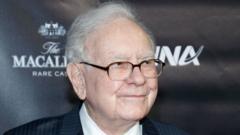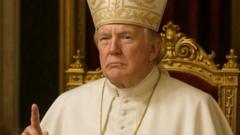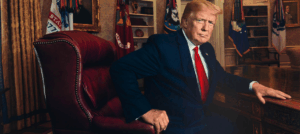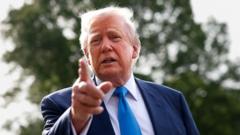This year's VE Day prompts mixed emotions across Europe, as many recall both the triumph over Nazism and the complex relationships with Russia and the U.S. Trump's approach to foreign policy raises concerns about the future of transatlantic ties, urging Europe to reconsider its defense strategies and responsibilities.
VE Day Reflections: Transatlantic Bonds Tested by New Challenges

VE Day Reflections: Transatlantic Bonds Tested by New Challenges
As Europe observes Victory in Europe Day, a critical examination reveals shifting sentiments towards the U.S. leadership, led by Donald Trump, in a landscape shaped by historical alliances and modern crises.
As Europe commemorates Victory in Europe (VE) Day, sentiments surrounding this significant anniversary reflect a complex legacy of shared triumph over Nazism, alongside newfound anxieties regarding transatlantic relations, particularly in the context of Donald Trump's leadership.
A former senior NATO diplomat, who wished to remain anonymous, expressed a dismal view of the celebrations, stating, "What celebration? It feels more like a funeral." The horrors of World War II, during which about 51 million soldiers and civilians perished, were rooted in a collective effort to defeat tyranny, but the celebration of this 80th anniversary seems overshadowed by contemporary political divisions.
Many Europeans now perceive Trump's presidency as a detractor from the foundational values that once bound the U.S. and its European allies. While many acknowledge that World War II forged lasting unity against common enemies, the reality is that different interpretations of history and allegiance cloud the current landscape.
Russia's historical role as a wartime ally complicates the narrative, with divisions resurfacing almost immediately after Germany’s defeat. Michael Zantovsky, a former Czech ambassador, emphasized that the early alliance with the Soviet Union was driven purely by necessity. He remarked, "Russia was never a true friend of the West," highlighting the skepticism that most European nations hold today towards Russia's geopolitical maneuvers.
This year's observances vary significantly across Europe. In Western nations, celebratory events are prominent, whereas sentiments in Central and Eastern Europe are muddied with recollections of post-war Communist regimes—offering a contrasting view of liberation and subsequent governance.
The ongoing conflict in Ukraine and implications of Russia's war have revived old fears, particularly for countries like the Czech Republic, where historical memories of occupation remain vivid. Zantovsky connects these modern concerns to Trump's overtures to Putin, stating, "That's why we feel so strongly for Ukraine."
As public trust in the U.S. wanes, a YouGov poll indicates that a significant majority of Western Europeans now consider the White House a threat to peace and security, shifting the perception of the once solidified U.S.-European alliance. European leaders are grappling with the implications of U.S. foreign policy that appears to blame Ukraine rather than Moscow for ongoing bloodshed.
Trump's rhetoric has raised alarms, particularly in Eastern Europe, where nations fear that his actions might embolden Russian expansionism. Calls for increased defense spending echo throughout Europe, as the traditional reliance on U.S. support feels increasingly tenuous to many European governments.
Consequently, Germany is re-evaluating its historical defense strategies. After years of restraint post-WWII, the political fallout from Trump’s tenure led to significant discussions on military investment and capability enhancement. "We cannot rely on the US anymore," states Peter Wittig, former German ambassador to Washington.
Though some European leaders view these changes as a necessary wake-up call, uncertainty looms over whether present-day electorates will approve fundamental shifts in governmental spending priorities to boost military capabilities.
As discussions continue around the reshaping of alliances and defense strategies, the quest for a new generation of leaders capable of navigating these turbulent times becomes increasingly urgent. "Something has certainly broken. The future is uncertain," warns political historian Timothy Garton Ash.
With WWII veterans' hopes for enduring peace at stake, the commemoration of VE Day serves as a critical reminder of the past while urging present leaders to confront the challenges that lie ahead.


















